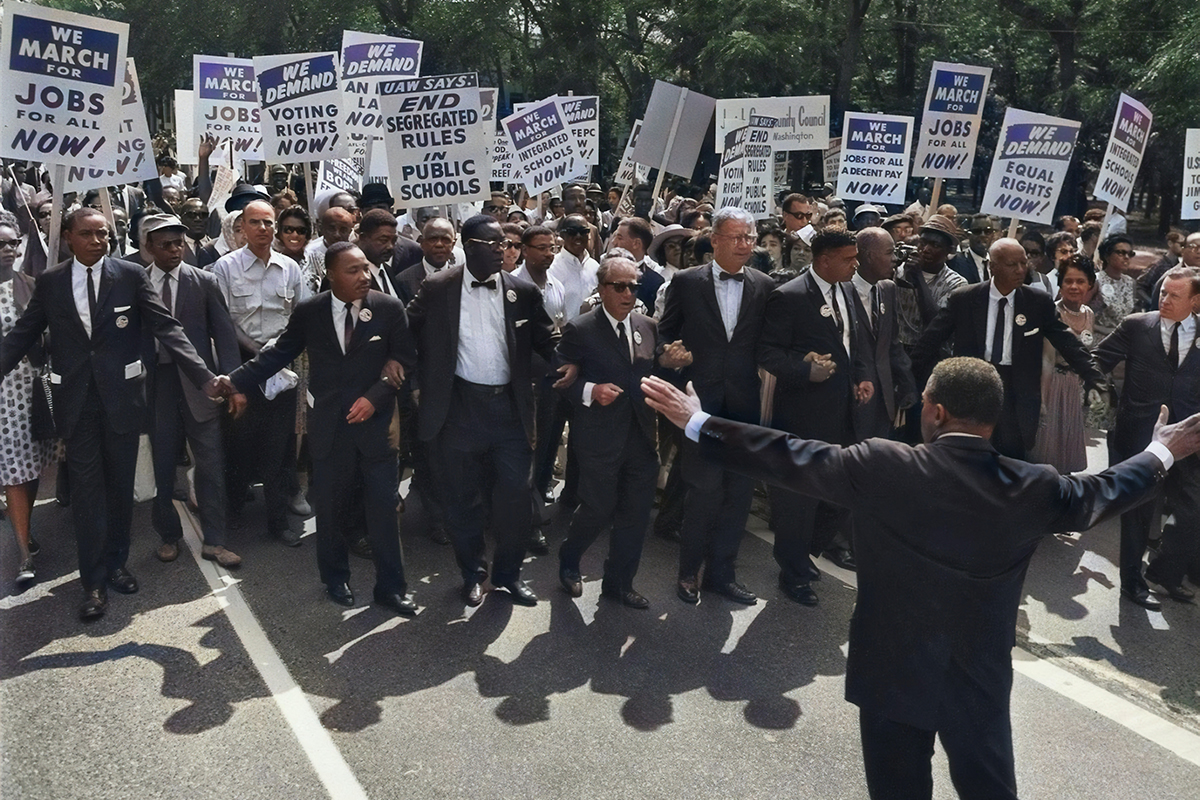
Martin Luther King Day is a federal holiday commemorating the life and achievements of Dr. King. MLK Day is held on the third Monday of January, close to his actual birthday of January 15. In 1983, President Ronald Reagan signed the holiday into law, and it was first observed federally three years later on January 20, 1986.
Learn more about Dr. King in this month's digital book display. View last year's MLK Day reading list.
Special thanks to our Materials Processing Coordinator Leah Zande for compiling this list. Feature image of "MLK in the March on Washington for Jobs and Freedom, in Washington, D.C. on Wednesday, August 28, 1963. The purpose of the march was to advocate for the civil and economic rights of African Americans." Photo by History in HD on Unsplash.
Dr. Martin Luther King Jr. and the Poor People's Campaign of 1968
Hamilton, Robert (2020)
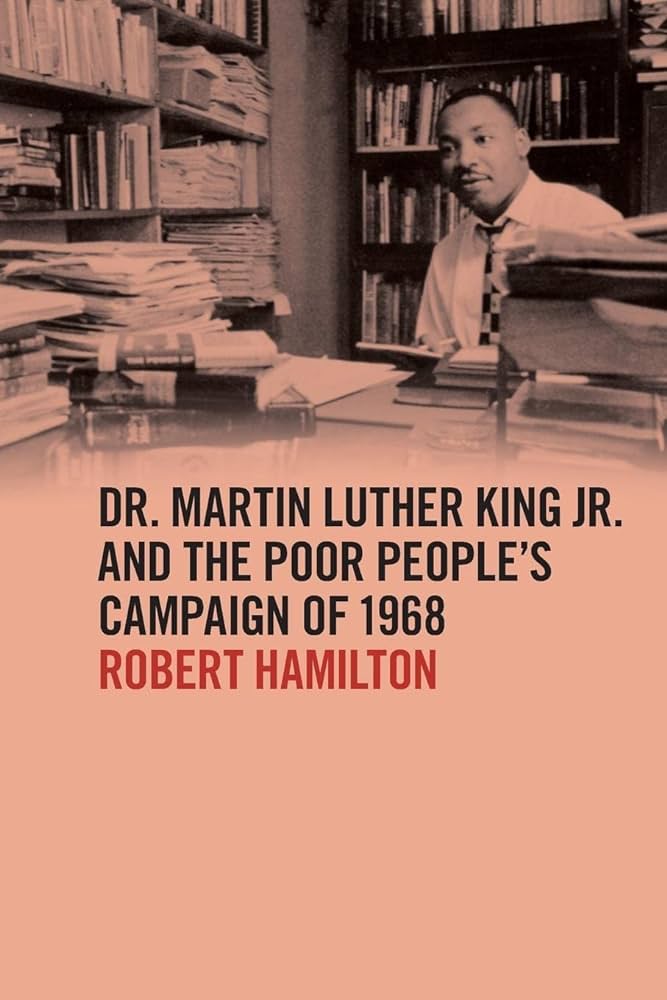 This book introduces new audiences to Dr. Martin Luther King Jr.’s final initiative, the multiracial Poor People’s Campaign (PPC) of 1968. Robert Hamilton depicts the experience of poor people who traveled to Washington in May 1968 to dramatize the issue of poverty by building a temporary city, Resurrection City. His narrative allows us to hear their voices and understand the strategies, objectives, and organization of the campaign. In addition, he highlights the campaign's educational aspect, showing that significant social movements are a means by which societies learn about themselves and framing the PPC as an initiative whose example can teach and inspire current and future generations. The study thus situates Dr. Martin Luther King Jr.’s legacy and teachings in relation to current events and further solidifies Dr. King’s cultural and sociopolitical relevance.
This book introduces new audiences to Dr. Martin Luther King Jr.’s final initiative, the multiracial Poor People’s Campaign (PPC) of 1968. Robert Hamilton depicts the experience of poor people who traveled to Washington in May 1968 to dramatize the issue of poverty by building a temporary city, Resurrection City. His narrative allows us to hear their voices and understand the strategies, objectives, and organization of the campaign. In addition, he highlights the campaign's educational aspect, showing that significant social movements are a means by which societies learn about themselves and framing the PPC as an initiative whose example can teach and inspire current and future generations. The study thus situates Dr. Martin Luther King Jr.’s legacy and teachings in relation to current events and further solidifies Dr. King’s cultural and sociopolitical relevance.
In the decades since 1968, we have seen increasing global inequality leading to greater social polarization, including in the United States. Hamilton offers the insight that the radical politics of Dr. King―as represented in the civil rights and human rights agendas of the PPC―can help us understand and address the challenges of this polarization. Hamilton highlights Dr. King’s commitment to ending poverty and explains why Dr. King’s ideas on this and related issues should be brought to the attention of a wider public who often view him almost exclusively as a civil rights, but not a human rights, leader. - Publisher's Description
Request this Title
Prophet of Discontent: Martin Luther King Jr. and the Critique of Racial Capitalism
Loggins, Jared; Douglas, Andrew (2021)
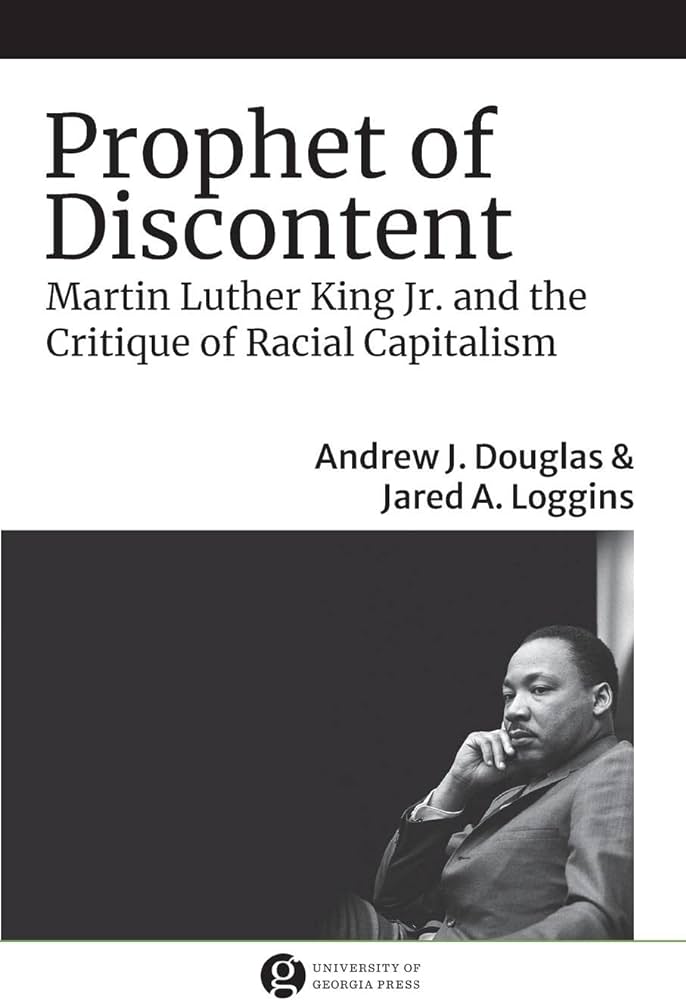 Many of today’s insurgent Black movements call for an end to racial capitalism. They take aim at policing and mass incarceration, the racial partitioning of workplaces and residential communities, the expropriation and underdevelopment of Black populations at home and abroad. Scholars and activists increasingly regard these practices as essential technologies of capital accumulation, evidence that capitalist societies past and present enshrine racial inequality as a matter of course.
Many of today’s insurgent Black movements call for an end to racial capitalism. They take aim at policing and mass incarceration, the racial partitioning of workplaces and residential communities, the expropriation and underdevelopment of Black populations at home and abroad. Scholars and activists increasingly regard these practices as essential technologies of capital accumulation, evidence that capitalist societies past and present enshrine racial inequality as a matter of course.
In "Prophet of Discontent," Andrew J. Douglas and Jared A. Loggins invoke contemporary discourse on racial capitalism in a powerful reassessment of Martin Luther King Jr.’s thinking and legacy. Like today’s organizers, King was more than a dreamer. He knew that his call for a “radical revolution of values” was complicated by the production and circulation of value under capitalism. He knew that the movement to build the beloved community required sophisticated analyses of capitalist imperialism, state violence, and racial formations, as well as unflinching solidarity with the struggles of the Black working class. Shining new light on King’s largely implicit economic and political theories, and expanding appreciation of the Black radical tradition to which he belonged, Douglas and Loggins reconstruct, develop, and carry forward King’s strikingly prescient critique of capitalist society. - Publisher's Description
Request this Title
The Preacher King: Martin Luther King, Jr. and the Word that Moved America
Lischer, Richard (1997)
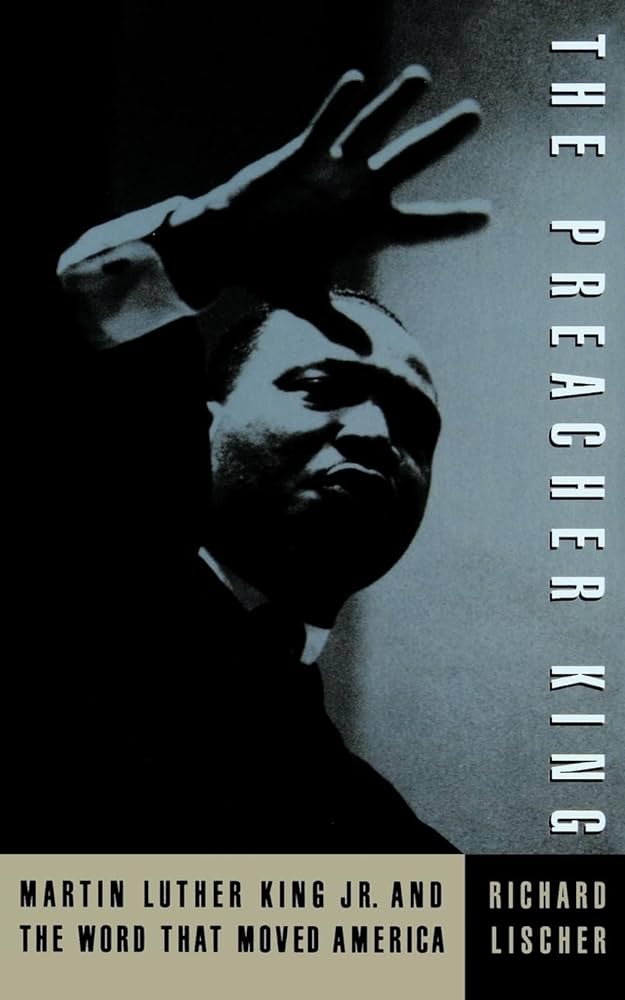 Today it seems extraordinary that a nation the size of the United States could have been so profoundly affected by the minister of a little Baptist church in Montgomery, Alabama. But at a turning point in American history, Martin Luther King, Jr., had an incalculable effect on the fabric of daily life and the laws of the nation. As no other preacher in living memory and no politician since Lincoln, he transposed the themes of love, suffering, deliverance, and justice from the sacred shelter of the pulpit into the arena of public policy. He was the last great religious reformer in America. How the man who always saw himself as "fundamentally a clergyman, a Baptist preacher" crafted his strategic vision and moved a nation to renewal is the subject of this remarkable new book.
Today it seems extraordinary that a nation the size of the United States could have been so profoundly affected by the minister of a little Baptist church in Montgomery, Alabama. But at a turning point in American history, Martin Luther King, Jr., had an incalculable effect on the fabric of daily life and the laws of the nation. As no other preacher in living memory and no politician since Lincoln, he transposed the themes of love, suffering, deliverance, and justice from the sacred shelter of the pulpit into the arena of public policy. He was the last great religious reformer in America. How the man who always saw himself as "fundamentally a clergyman, a Baptist preacher" crafted his strategic vision and moved a nation to renewal is the subject of this remarkable new book.
"The Preacher King" investigates Martin Luther King Jr.'s, religious development from a precocious "PK" ("preacher's kid") in segregated Atlanta to the most influential American preacher and orator of the twentieth century. To give the most accurate and intimate portrait possible, author Richard Lischer draws almost exclusively on King's unpublished sermons and speeches, as well as tape recordings, personal interviews, and even police surveillance reports. In King's published works, Lischer shows, King and his editors modified and polished his sermons in order to reach as wide an audience as possible. By returning to the raw sources, Lischer recaptures King's real, African-American, preaching voice and, consequently, something of the real King himself. He shows how as the son, the grandson, and the great-grandson of preachers, King early on absorbed the poetic cadences, the traditions, and the power of the pulpit. He traces King's coming of age from his rebellious teenage years (King once wrote that at thirteen he shocked his Sunday School class by "denying the bodily resurrection of Jesus") to his arrival in Montgomery, where he took on the role of "Brother Pastor" to his flock during the year of ministry before he burst into national prominence. Lischer shows that King was as profoundly influenced by his fellow African-American preachers as he was by Gandhi and the philosophers, and tracks King's themes of brotherhood and justice from the set pieces of his weekly sermons to his electrifying mass meeting speeches, demonstrations, and civil addresses. Lischer also reveals a later phase of King's development that few of his biographers or critics have addressed: the prophetic rage with which he condemned American religious and political hypocrisy. During the last three years of his life, Lischer shows, King accused his country of genocide, warned of long hot summers in the ghettos, and called for a radical redistribution of wealth. - Publisher's Description
Request this Title
King: A Biography
Lewis, David Levering (2013)
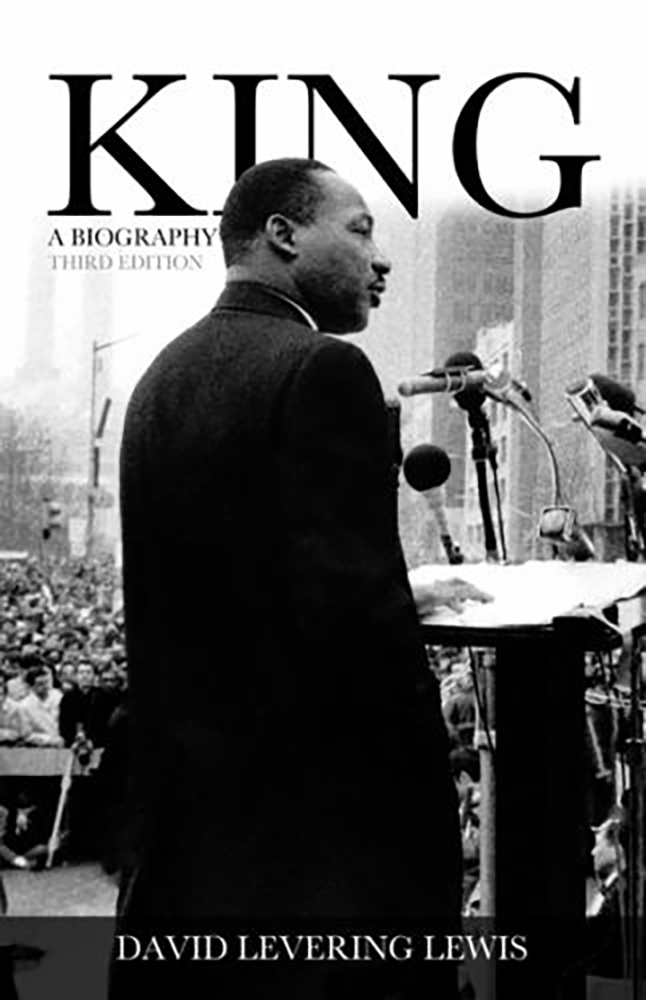 Acclaimed by leading historians and critics when it appeared shortly after the death of Dr. Martin Luther King Jr., this foundational biography wends through the corridors in which King held court, posing the right questions and providing a keen measure of the man whose career and mission enthrall scholars and general readers to this day.
Acclaimed by leading historians and critics when it appeared shortly after the death of Dr. Martin Luther King Jr., this foundational biography wends through the corridors in which King held court, posing the right questions and providing a keen measure of the man whose career and mission enthrall scholars and general readers to this day.
Updated with a new preface and more than a dozen photographs of King and his contemporaries, this edition presents the unforgettable story of King's life and death for a new generation. - Publisher's Description
Request this Title
From Civil Rights to Human Rights: Martin Luther King, Jr., and the Struggle for Economic Justice
Jackson, Thomas (2011)
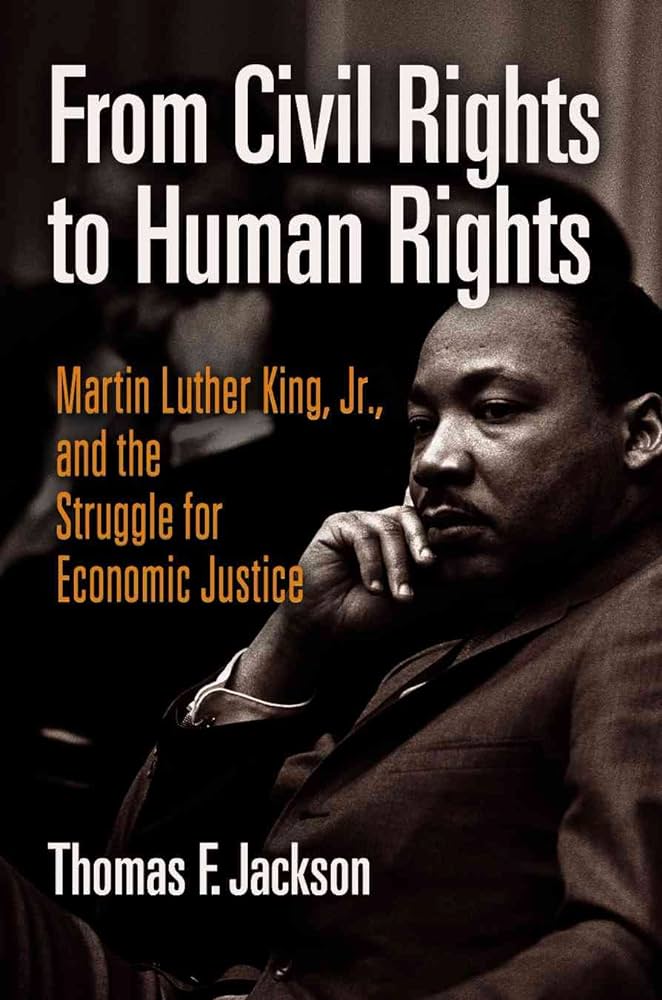 Martin Luther King, Jr., is widely celebrated as an American civil rights hero. Yet King's nonviolent opposition to racism, militarism, and economic injustice had deeper roots and more radical implications than is commonly appreciated, Thomas F. Jackson argues in this searching reinterpretation of King's public ministry. Between the 1940s and the 1960s, King was influenced by and in turn reshaped the political cultures of the black freedom movement and democratic left. His vision of unfettered human rights drew on the diverse tenets of the African American social gospel, socialism, left-New Deal liberalism, Gandhian philosophy, and Popular Front internationalism.
Martin Luther King, Jr., is widely celebrated as an American civil rights hero. Yet King's nonviolent opposition to racism, militarism, and economic injustice had deeper roots and more radical implications than is commonly appreciated, Thomas F. Jackson argues in this searching reinterpretation of King's public ministry. Between the 1940s and the 1960s, King was influenced by and in turn reshaped the political cultures of the black freedom movement and democratic left. His vision of unfettered human rights drew on the diverse tenets of the African American social gospel, socialism, left-New Deal liberalism, Gandhian philosophy, and Popular Front internationalism.
King's early leadership reached beyond southern desegregation and voting rights. As the freedom movement of the 1950s and early 1960s confronted poverty and economic reprisals, King championed trade union rights, equal job opportunities, metropolitan integration, and full employment. When the civil rights and antipoverty policies of the Johnson administration failed to deliver on the movement's goals of economic freedom for all, King demanded that the federal government guarantee jobs, income, and local power for poor people. When the Vietnam war stalled domestic liberalism, King called on the nation to abandon imperialism and become a global force for multiracial democracy and economic justice.
Drawing widely on published and unpublished archival sources, Jackson explains the contexts and meanings of King's increasingly open call for "a radical redistribution of political and economic power" in American cities, the nation, and the world. The mid-1960s ghetto uprisings were in fact revolts against unemployment, powerlessness, police violence, and institutionalized racism, King argued. His final dream, a Poor People's March on Washington, aimed to mobilize Americans across racial and class lines to reverse a national cycle of urban conflict, political backlash, and policy retrenchment. King's vision of economic democracy and international human rights remains a powerful inspiration for those committed to ending racism and poverty in our time. - Publisher's Description
Request this Title
Behind the Public Veil: The Humanness of Martin Luther King Jr.
Baldwin, Lewis (2016)
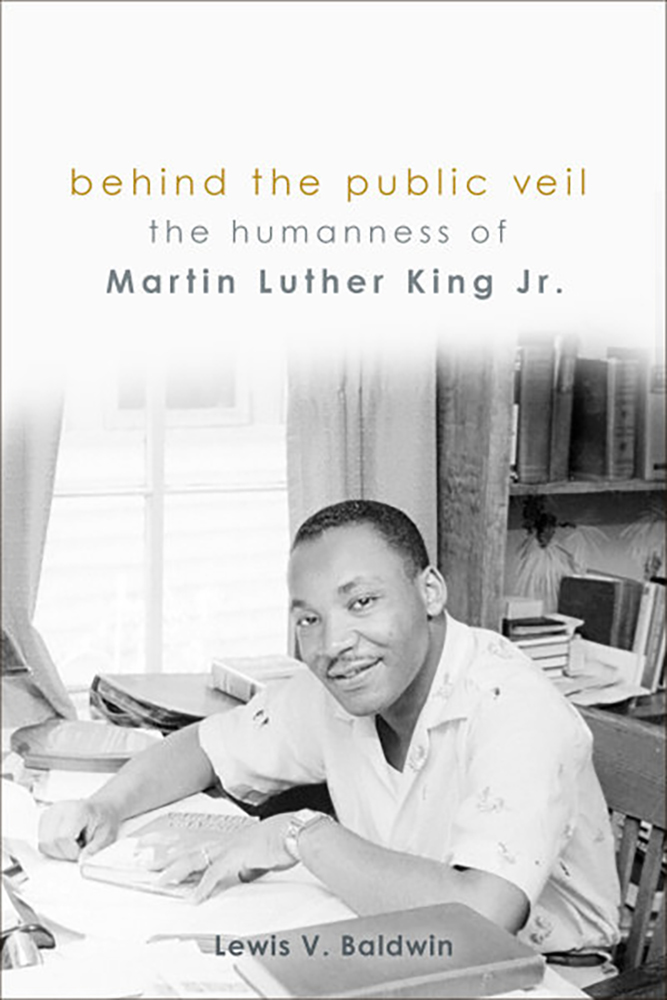 What was Martin Luther King Jr. really like? In this groundbreaking volume, Lewis V. Baldwin answers this question by focusing on the man himself. Drawing on the testimonies of friends, family, and closest associates, this volume adds much-needed biographical background to the discussion, as Baldwin looks beyond all of the mythic, messianic, and iconic images to treat King in terms of his fundamental and vivid humanness. Special attention is devoted to Kings personal insecurities and struggles, his humility and affinity to common people, his delight in pleasant and passionate conversation, his insatiable love for the precious but ordinary things of life, his robust appetite for artfully-prepared and delicious soul food, his enduring appreciation for music and dance, his cheerful and playful attitude and spirit, his abiding interest in games and sports, and his amazing gift of wit, humor, and laughter.
What was Martin Luther King Jr. really like? In this groundbreaking volume, Lewis V. Baldwin answers this question by focusing on the man himself. Drawing on the testimonies of friends, family, and closest associates, this volume adds much-needed biographical background to the discussion, as Baldwin looks beyond all of the mythic, messianic, and iconic images to treat King in terms of his fundamental and vivid humanness. Special attention is devoted to Kings personal insecurities and struggles, his humility and affinity to common people, his delight in pleasant and passionate conversation, his insatiable love for the precious but ordinary things of life, his robust appetite for artfully-prepared and delicious soul food, his enduring appreciation for music and dance, his cheerful and playful attitude and spirit, his abiding interest in games and sports, and his amazing gift of wit, humor, and laughter.
King emerges here as an ordinary human being who enjoyed and celebrated life to the fullest, but was never bigger than life. Here we see the personal qualities of King as a real, fleshly human beingand also as a man shaped by his social and cultural experiences and locations. This book reclaims the man behind the mythology. - Publisher's Description
Request this Title
Dangerous Friendship: Stanley Levison, Martin Luther King, Jr., and the Kennedy Brothers
Kamin, Ben (2014)
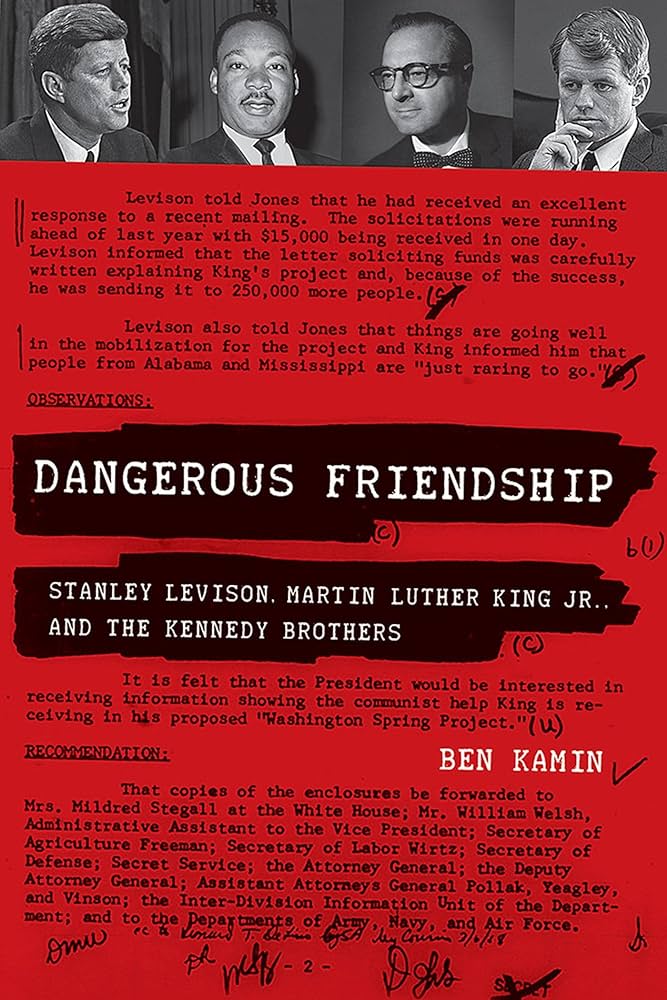 The product of long-concealed FBI surveillance documents, Dangerous Friendship chronicles a history of Martin Luther King Jr. that the government kept secret from the public for years. The book reveals the story of Stanley Levison, a well-known figure in the Communist Party–USA, who became one of King’s closest friends and, effectively, his most trusted adviser. Levison, a Jewish attorney and businessman, became King’s pro bono ghostwriter, accountant, fundraiser, and legal adviser. This friendship, however, created many complications for both men. Because of Levison’s former ties to the Communist Party, FBI director J. Edgar Hoover launched an obsessive campaign, wiretapping, tracking, and photographing Levison relentlessly. By association, King was labeled as “a Communist and subversive,” prompting then–attorney general Robert F. Kennedy to authorize secret surveillance of the civil rights leader. It was this effort that revealed King’s sexual philandering and furthered a breakdown of trust between King, Robert F. Kennedy, and eventually President John F. Kennedy.
The product of long-concealed FBI surveillance documents, Dangerous Friendship chronicles a history of Martin Luther King Jr. that the government kept secret from the public for years. The book reveals the story of Stanley Levison, a well-known figure in the Communist Party–USA, who became one of King’s closest friends and, effectively, his most trusted adviser. Levison, a Jewish attorney and businessman, became King’s pro bono ghostwriter, accountant, fundraiser, and legal adviser. This friendship, however, created many complications for both men. Because of Levison’s former ties to the Communist Party, FBI director J. Edgar Hoover launched an obsessive campaign, wiretapping, tracking, and photographing Levison relentlessly. By association, King was labeled as “a Communist and subversive,” prompting then–attorney general Robert F. Kennedy to authorize secret surveillance of the civil rights leader. It was this effort that revealed King’s sexual philandering and furthered a breakdown of trust between King, Robert F. Kennedy, and eventually President John F. Kennedy.
With stunning revelations, this book exposes both the general attitude of the U.S. government toward the privacy rights of American citizens during those difficult years as well as the extent to which King, Levison, and many other freedom workers were hounded by people at the very top of the U.S. security establishment. - Publisher's Description
Request this Title
April 4, 1968: Martin Luther King, Jr.'s Death and How it Changed America
Dyson, Michael (2009)
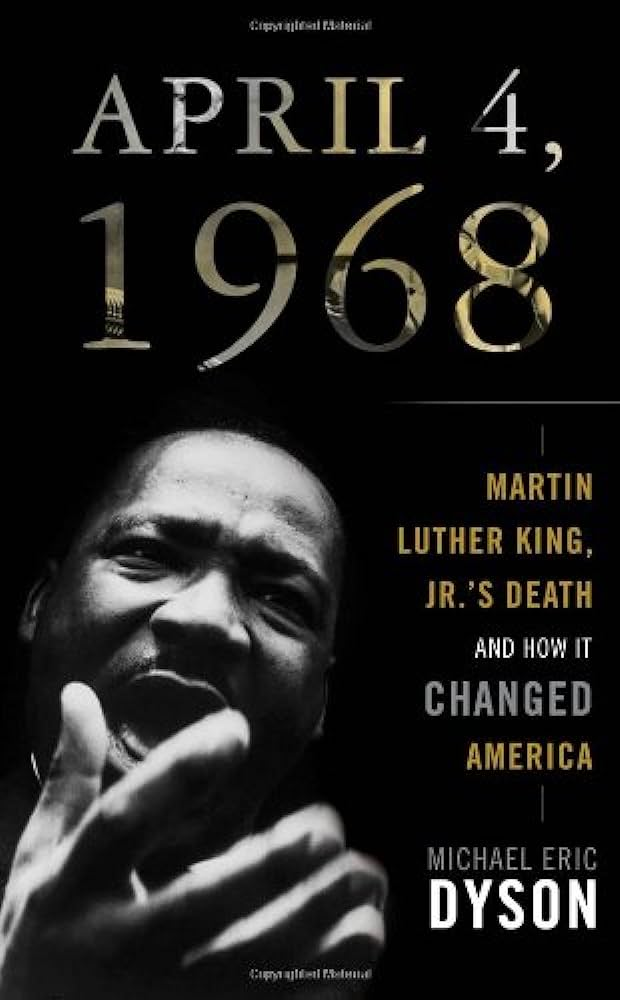 On April 4, 1968, at 6:01 PM, while he was standing on a balcony at a Memphis hotel, Martin Luther King, Jr. was shot and fatally wounded. Only hours earlier Kingthe prophet for racial and economic justice in America ended his final speech with the words, I may not get there with you, but I want you to know tonight, that we as a people will get to the Promised Land.”
On April 4, 1968, at 6:01 PM, while he was standing on a balcony at a Memphis hotel, Martin Luther King, Jr. was shot and fatally wounded. Only hours earlier Kingthe prophet for racial and economic justice in America ended his final speech with the words, I may not get there with you, but I want you to know tonight, that we as a people will get to the Promised Land.”
Acclaimed public intellectual and best-selling author Michael Eric Dyson uses the fortieth anniversary of King's assassination as the occasion for a provocative and fresh examination of how King fought, and faced, his own death, and we should use his death and legacy. Dyson also uses this landmark anniversary as the starting point for a comprehensive reevaluation of the fate of Black America over the four decades that followed King's death. Dyson ambitiously investigates the ways in which African-Americans have in fact made it to the Promised Land of which King spoke, while shining a bright light on the ways in which the nation has faltered in the quest for racial justice. He also probes the virtues and flaws of charismatic black leadership that has followed in King's wake, from Jesse Jackson to Barack Obama.
Always engaging and inspiring, April 4, 1968 celebrates the prophetic leadership of Dr. King, and challenges America to renew its commitment to his deeply moral vision. - Publisher's Description
Request this Title
Misremembering Dr. King: Revisiting the Legacy of Martin Luther King Jr.
Yanco, Jennifer (2014)
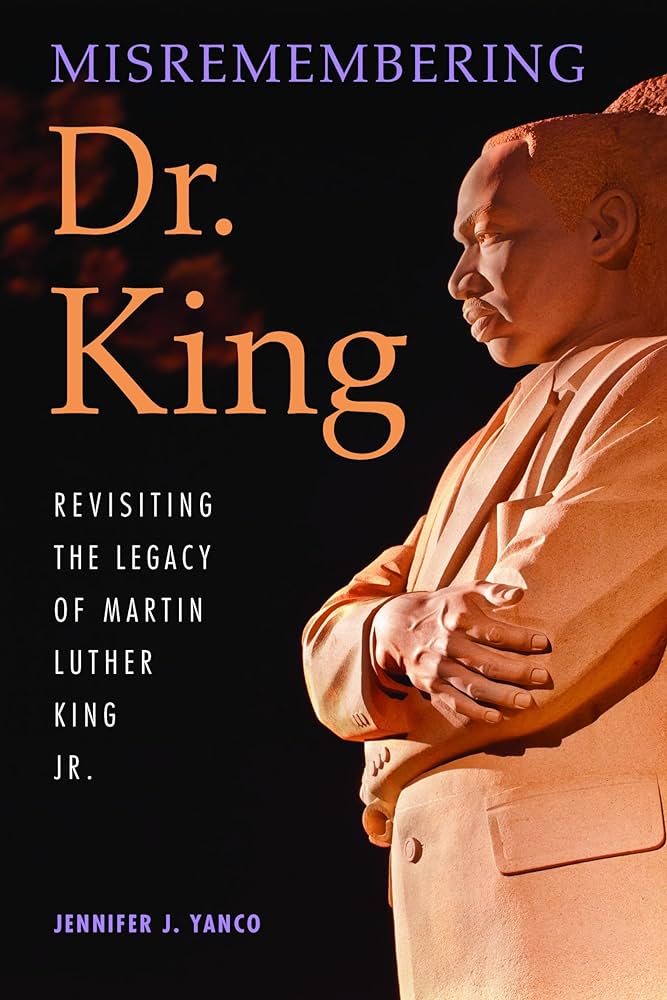 We all know the name. Martin Luther King Jr., the great American civil rights leader. But most people today know relatively little about King, the campaigner against militarism, materialism, and racism―what he called the "giant triplets." Jennifer J. Yanco takes steps to redress this imbalance. "My objective is to highlight the important aspects of Dr. King's work which have all but disappeared from popular memory, so that more of us can really 'see' King."
We all know the name. Martin Luther King Jr., the great American civil rights leader. But most people today know relatively little about King, the campaigner against militarism, materialism, and racism―what he called the "giant triplets." Jennifer J. Yanco takes steps to redress this imbalance. "My objective is to highlight the important aspects of Dr. King's work which have all but disappeared from popular memory, so that more of us can really 'see' King."
After briefly telling the familiar story of King's civil rights campaigns and accomplishments, she considers the lesser-known concerns that are an essential part of his legacy. Yanco reminds us that King was a strong critic of militarism who argued that the United States should take the lead in promoting peaceful solutions rather than imposing its will through military might; that growing materialism and an ethos of greed was damaging the moral and spiritual health of the country; and that in a nation where racism continues unabated, white Americans need to educate themselves about racism and its history and take their part in the weighty task of dismantling it. - Publisher's Description
Request this Title
The Civil Rights Movement
Newman, Mark (2019)
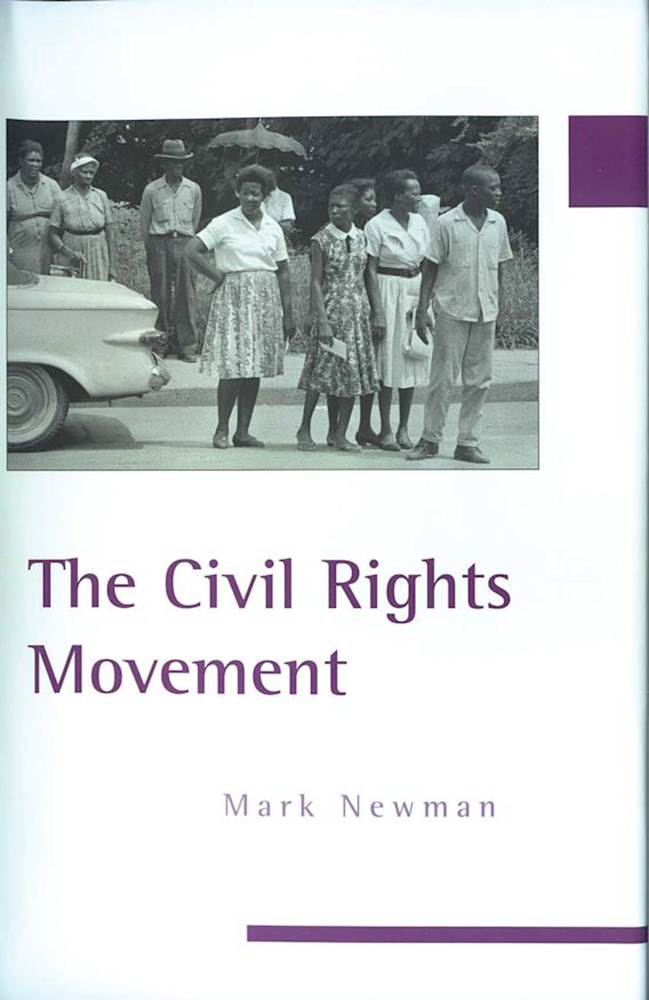 Mark Newman outlines the range of white responses to the Civil Rights Movement and analyses both northern and southern opinion. He examines the role of the federal government, the church and organized labor, as well as the impact of the Cold War. The book discusses local, regional, and national civil rights campaigns; the utility of nonviolent direct action; and the resurgence of Black Nationalism. And it explains the development, achievements and disintegration of the national civil rights coalition, the role of Martin Luther King Jr. and the contribution of many otherwise ordinary men and women to the movement.
Mark Newman outlines the range of white responses to the Civil Rights Movement and analyses both northern and southern opinion. He examines the role of the federal government, the church and organized labor, as well as the impact of the Cold War. The book discusses local, regional, and national civil rights campaigns; the utility of nonviolent direct action; and the resurgence of Black Nationalism. And it explains the development, achievements and disintegration of the national civil rights coalition, the role of Martin Luther King Jr. and the contribution of many otherwise ordinary men and women to the movement.
The National Association for the Advancement of Colored People receives particular attention, with contrasts drawn between the national office and state conferences and local branches. In detailing and assessing the African-American struggle between the 1930s and 1980s, Newman widens the movement's traditional chronology, offering readers a broad-ranging history. - Publisher's Description
Request this Title
